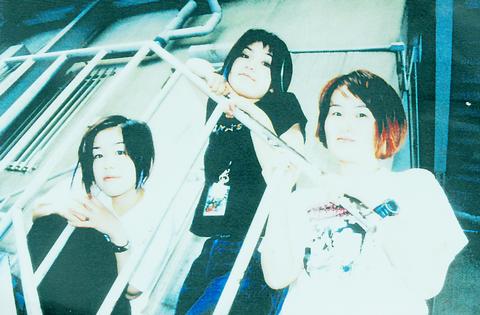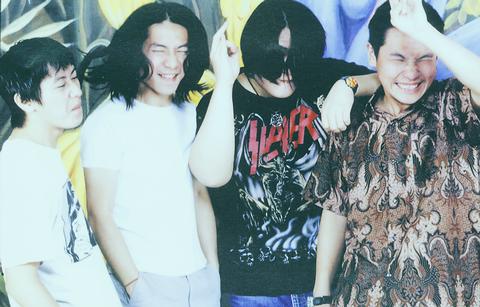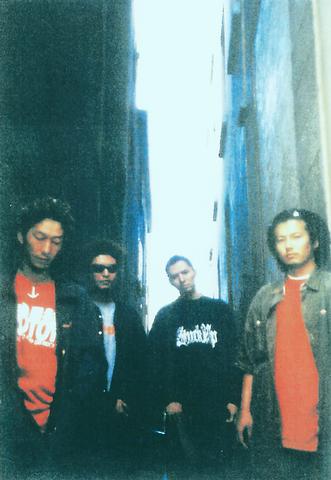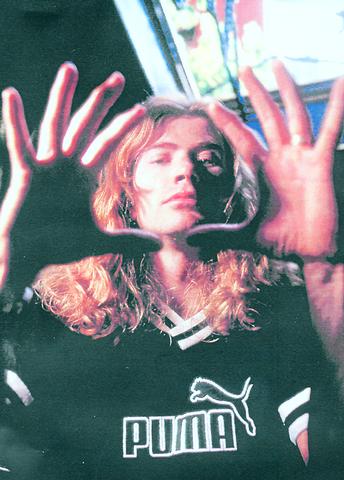The Formoz Festival 2001 will not be just another rock concert in Taiwan. It will be the first festival to bring monsters of rock like Megadeth and Biohazard from the outside world to a venue in Taiwan where slam dancing is allowed. In addition to lots and lots of hard rock, the concert will also take on a touch of political significance, as it will be the first time rock bands from China and Taiwan perform together on the same stage.
Behind it all is a local black metal impresario, Freddy (
Over the last four years, he has also managed to rebuild Taiwan's major indie rock music network, the Taiwan Rock Alliance (TRA), from what was once a smoldering wreck. When he took over the organization, then called the North Collegiate Rock Alliance (NCRA), it only had one member (the founder), was in debt NT$50,000 and consisted mainly of a paper bag full of band information sheets. Now, Freddy is using the TRA to create Taiwan's first megaconcert and what he calls "a rare opportunity to bring rock bands from all over the Mandarin-speaking world."

PHOTO COURTESY OF TRA
When Formoz takes place from July 27 to July 29 in Taipei, the festival will bring together bands from Taiwan, China, Hong Kong and Singapore as well as headliners from the US and Japan. And in spite of the potential geopolitical significance of it all, Freddy says, "this is not really a political concert."
Well, yes and no. It would be hard to say that Freddy himself is completely free of politics, because, like everyone else in Taiwan, he has been caught in the middle of a political conflict that has lasted his whole life. Here, even an apolitical viewpoint is still a political expression. And apolitical perhaps best describes Freddy's politics. He is neither DPP nor KMT; he is neither pro-Taiwan independence nor pro-unification. Instead, he supports a more subtle stance of affirming Taiwan's identity without rejecting China. At least that's what it looks like from the concerts he's organized so far.
TRA's "Say Yes To Taiwan" concert series, which took place in March, adopted a semi-political theme of support for Taiwan identity, in part to garner DPP financial support. Between a few of the head banging sets, slightly disoriented politicians took the stage to take a stab at the youth vote. There were also foreigners, including members from a local expat band Milk, and the Japanese cutie punk rockers of Softball, on stage screaming out, "Say yes to Taiwan." And they didn't just say it once in a nominal show of support, they said it over and over again.

PHOTO: COURTESY OF TRA
Formoz, meanwhile, has fallen into a position of playing up themes of continuity among East Asia's major Chinese communities. It has also incorporated Japan, with multimillion album-selling group the Garlic Boys and the three-girl hit thrash act Yellow Machine Gun. It's almost as if to say Asia's younger generation doesn't care about all that ancient feuding anymore. What Freddy says is, "these are just the bands I like, and I want to give people here a chance to see them."
The bands themselves reinforce such a view, as by and large, they are more similar than they are different. Tang Dynasty and Overload are emblems of the Beijing rock scene, and are best known for satirical social commentary, not direct political discourse. The same could be said for punk rockers LTK and the Clippers from Taiwan and Opposition Party from Singapore. Other bands, like Japan's Garlic Boys, Taiwan's Anarchy and Hong Kong's skate and slam group LMF are more about venting teen angst, which is just another kind of social critique when it comes down to it.
Putting together Formoz has been a remarkable feat in itself. As a hard rock show, sponsors have not been beating down the door. Moreover, Taiwan's cable networks have the odd habit of making concert promoters, even for the likes of Coco Lee, pay for coverage, rather than the other way around. So Formoz's only sponsor is Yankee Beer, a newly launched product by Taiwan's Wine and Tobacco Monopoly. The rest of the funding is coming from TRA and ticket sales.

PHOTO COURTESY OF TRA
Equally cumbersome are the difficulties of bringing major Chinese metal acts to Taiwan, something that has never been done before. The two-month process involves visas and all kinds of bureaucratic hurdles, including permits to be obtained from the Bureau of Immigration, Ministry of Education (which approves visits by foreign performers) and the Council of Cultural Affairs.
Within these government agencies Freddy says he has found both support and resistance. At one point, he said that the Bureau of Immigration simply told him, "Taiwan hasn't opened up to Mainland [Chinese] performers yet."
Of course, this is patently untrue. Na Ying (

PHOTO COURTESY OF TRA
In recent years, in fact, Taiwan and China have slowly increased levels of cultural exchange, opening the way for not only pop icons, but also opera groups, museum collections and even occasional visiting scholars.
The difference with Formoz, said Freddy, is that the Chinese bands Tang Dynasty, Overload and Thin Man "don't look like Na Ying. They have long hair and wear dirty clothes. They don't look normal, so [the bureaucrats] don't know what to think about them."
So he's enlisted the help of the Government Information Office, who brought Na Ying, and he's working through the bureaucratic tangles. "We'd actually like to bring more bands from China," he said, "but the application process is so long that there isn't enough time anymore."
To plan the concert itself, Freddy and TRA also enlisted the help of Smash Corp, the company that has run Japan's premier supershow, Fuji Rock, since 1997. Freddy first met the Smash people last year when Chthonic became Taiwan's first-ever representative at the event in Japan and played alongside the power houses of the world rock scene -- bands like Sonic Youth, the Beastie Boys, Foo Fighters and Fishbone.
The experience provided the impetus to further improve TRA's annual Taiwan Rock Festival, which last year virtually outgrew Taiwan, as organizers had to reduce a pool of 400 applications to 100 acts. That's a big change from seven years ago at the first festival, when every applicant in Taiwan could play. "After we went to Fuji Rock last year," said Freddy, "we thought maybe it was time to bring Taiwan up a level."
Talks between TRA and Smash ensued. Basically, the Smash people offered up loads of free advice in three Tokyo meetings since last summer, and the result was TRA's own blueprint for Formoz.
The plan calls for a three-day festival at Whashang Arts District, an abandoned brewery complex in the middle of Taipei. The venue should allow for standard rock concert behavior, unlike Taipei's Sun Yat Sen Memorial Hall or other theaters that threaten to stop rock shows once audience members stand up.
And what if the media jumps on the cross strait angle, as Freddy guesses they might? Well, he's not too worried that politics will overshadow the head banging. After all, it's pretty hard to overshadow Megadeth.
Bands:
Megadeth (US), Biohazard (US), Yo La Tengo (US), Yellow Machine Gun (Japan), Magane (Japan), Garlic Boys (Japan), Tang Dynasty (唐代, China), Overload (超載, China), Thin Man (瘦人, China), LMF (Hong Kong), Opposition Party (Singapore), Anarchy (無政府, Taiwan), LTK (濁水溪公社, Taiwan) plus about 30 other Taiwanese bands
For more concert information, check http://www.formoz.com
Tickets are available at Roxy 99 and Underworld in Taipei and Y2K in Taichung. Three-day concert passes cost NT$3,500 and single day passes cost NT$1,999.

The primaries for this year’s nine-in-one local elections in November began early in this election cycle, starting last autumn. The local press has been full of tales of intrigue, betrayal, infighting and drama going back to the summer of 2024. This is not widely covered in the English-language press, and the nine-in-one elections are not well understood. The nine-in-one elections refer to the nine levels of local governments that go to the ballot, from the neighborhood and village borough chief level on up to the city mayor and county commissioner level. The main focus is on the 22 special municipality

The People’s Republic of China (PRC) invaded Vietnam in 1979, following a year of increasingly tense relations between the two states. Beijing viewed Vietnam’s close relations with Soviet Russia as a threat. One of the pretexts it used was the alleged mistreatment of the ethnic Chinese in Vietnam. Tension between the ethnic Chinese and governments in Vietnam had been ongoing for decades. The French used to play off the Vietnamese against the Chinese as a divide-and-rule strategy. The Saigon government in 1956 compelled all Vietnam-born Chinese to adopt Vietnamese citizenship. It also banned them from 11 trades they had previously

Jan. 12 to Jan. 18 At the start of an Indigenous heritage tour of Beitou District (北投) in Taipei, I was handed a sheet of paper titled Ritual Song for the Various Peoples of Tamsui (淡水各社祭祀歌). The lyrics were in Chinese with no literal meaning, accompanied by romanized pronunciation that sounded closer to Hoklo (commonly known as Taiwanese) than any Indigenous language. The translation explained that the song offered food and drink to one’s ancestors and wished for a bountiful harvest and deer hunting season. The program moved through sites related to the Ketagalan, a collective term for the

As devices from toys to cars get smarter, gadget makers are grappling with a shortage of memory needed for them to work. Dwindling supplies and soaring costs of Dynamic Random Access Memory (DRAM) that provides space for computers, smartphones and game consoles to run applications or multitask was a hot topic behind the scenes at the annual gadget extravaganza in Las Vegas. Once cheap and plentiful, DRAM — along with memory chips to simply store data — are in short supply because of the demand spikes from AI in everything from data centers to wearable devices. Samsung Electronics last week put out word